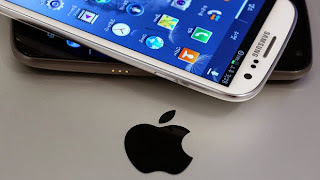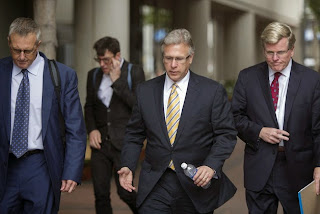 Earlier today, Harold McElhinny, a lawyer for Apple, foreshadowed Samsung’s argument, arguing that the company is “going to point the finger at Google,” by claiming the features at issue are “Android software, we get it from Google.”
Earlier today, Harold McElhinny, a lawyer for Apple, foreshadowed Samsung’s argument, arguing that the company is “going to point the finger at Google,” by claiming the features at issue are “Android software, we get it from Google.”“Don’t be misled,” McElhinny said. “This case is not about Google. It is Samsung, not Google that has made the decision to put these features in its phones.” It’s Samsung and not Google, he repeated that is “selling these products for a profit” and which “keeps on infringing Apple’s intellectual property.” Using teams of lawyers almost identical to those in the 2012 trial, each side will call as witnesses a mix of company executives and industry experts to try to show that sales of its rival’s products were driven by copied technology.
 Galaxy S3
Apple claims that 10 Samsung products, including the Galaxy S3, infringe five patents and is seeking about $2 billion in damages, according to a court filing. Samsung alleges that nine Apple products, including the iPhone 5 and versions of the iPad and iPod, infringe two patents. Samsung seeks about $6.9 million in damages, according to a court filing.
In opening arguments and evidence so far, Apple has recycled much of what worked for the company in the 2012 trial.
Philip Schiller, Apple’s senior vice president of product marketing and a confidant of founder Steve Jobs, testified in the first case and was the company’s first witness today. He explained a 2007 television ad shown to jurors demonstrating the smartphone slide-to-unlock feature that Apple claims is covered by one of its patents asserted against Samsung. Viewers experienced the “feel” of the underlying software in the 30 second ad, Schiller said.
‘Instant Idea’
“You get an instant idea of how multi-touch works,” Schiller said. “That one starting point was a great beginning to your understanding of what the iPhone is, and what this device can do.”
Schiller’s testimony supported claims about the enormous risk the company took in redirecting resources to researching and developing a phone. Introducing typing and gestures on a flat glass screen was especially “unusual and risky,” Schiller said. He said the first smartphone a consumer buys influences future purchases and said he believes Samsung’s infringement has “confused” consumers. The testimony helps lay the groundwork for the lost profit and damages Apple is seeking.
Samsung’s witness list includes seven employees of Google, which isn’t a party to the lawsuit. Google spokesman Matt Kallman, declined to comment on the trial.
Jobs realized that against Google’s strides, Apple faced an “innovator’s dilemma,” Quinn told jurors. He described an internal October 2010 e-mail from Jobs announcing a “2011: Holy War with Google,” saying one of the Cupertino, California-based company’s goals was to “Catch up to Google” in its Android and cloud service capabilities.
First Trial
In the first trial, jurors found Samsung infringed six of seven Apple patents related to earlier models and rejected all of Samsung’s claims against Apple products. Damages against Samsung were reduced to $930 million after a retrial. Samsung has appealed that award, as well as the original infringement verdict.
Apple was unable after the 2012 verdict to persuade Koh to ban the sale of Samsung’s infringing products in the U.S., a goal that the iPhone maker has said is more important than monetary compensation. Koh, acting on orders from an appeals court, reconsidered her decision and concluded March 11 that Apple still hadn’t marshaled enough evidence to support its request covering more than 20 devices no longer on the market. If Apple again convinces jurors that its technology was copied, it can then try anew for a sales ban.
Earlier today, two jurors were dismissed -- one because of illness and another who claimed financial hardship -- reducing the jury to four women and four men.
IBM Retiree
One juror is a retired International Business Machines Corp. (IBM) software systems manager, who said he oversaw developers at a software division that sought to patent inventions and was responsible for profit-and-loss statements and providing technical direction. He also gave a deposition in a lawsuit accusing Compuware Corp. of copying IBM’s code, a case that settled before trial.
“Someone with that kind of background is likely to be influential on a jury,” Mark Lemley, a professor at Stanford Law School who isn’t involved in the case, said in an e-mail. “The question is, in which direction.”
“IBM was known for aggressively patenting software, but software engineers themselves don’t tend to think highly of software patents,” Lemley said. “So both sides might see him as a potential ally.”
The case is Apple Inc. v. Samsung Electronics Co., 12-cv-00630, U.S. District Court, Northern District of California (San Jose).
Galaxy S3
Apple claims that 10 Samsung products, including the Galaxy S3, infringe five patents and is seeking about $2 billion in damages, according to a court filing. Samsung alleges that nine Apple products, including the iPhone 5 and versions of the iPad and iPod, infringe two patents. Samsung seeks about $6.9 million in damages, according to a court filing.
In opening arguments and evidence so far, Apple has recycled much of what worked for the company in the 2012 trial.
Philip Schiller, Apple’s senior vice president of product marketing and a confidant of founder Steve Jobs, testified in the first case and was the company’s first witness today. He explained a 2007 television ad shown to jurors demonstrating the smartphone slide-to-unlock feature that Apple claims is covered by one of its patents asserted against Samsung. Viewers experienced the “feel” of the underlying software in the 30 second ad, Schiller said.
‘Instant Idea’
“You get an instant idea of how multi-touch works,” Schiller said. “That one starting point was a great beginning to your understanding of what the iPhone is, and what this device can do.”
Schiller’s testimony supported claims about the enormous risk the company took in redirecting resources to researching and developing a phone. Introducing typing and gestures on a flat glass screen was especially “unusual and risky,” Schiller said. He said the first smartphone a consumer buys influences future purchases and said he believes Samsung’s infringement has “confused” consumers. The testimony helps lay the groundwork for the lost profit and damages Apple is seeking.
Samsung’s witness list includes seven employees of Google, which isn’t a party to the lawsuit. Google spokesman Matt Kallman, declined to comment on the trial.
Jobs realized that against Google’s strides, Apple faced an “innovator’s dilemma,” Quinn told jurors. He described an internal October 2010 e-mail from Jobs announcing a “2011: Holy War with Google,” saying one of the Cupertino, California-based company’s goals was to “Catch up to Google” in its Android and cloud service capabilities.
First Trial
In the first trial, jurors found Samsung infringed six of seven Apple patents related to earlier models and rejected all of Samsung’s claims against Apple products. Damages against Samsung were reduced to $930 million after a retrial. Samsung has appealed that award, as well as the original infringement verdict.
Apple was unable after the 2012 verdict to persuade Koh to ban the sale of Samsung’s infringing products in the U.S., a goal that the iPhone maker has said is more important than monetary compensation. Koh, acting on orders from an appeals court, reconsidered her decision and concluded March 11 that Apple still hadn’t marshaled enough evidence to support its request covering more than 20 devices no longer on the market. If Apple again convinces jurors that its technology was copied, it can then try anew for a sales ban.
Earlier today, two jurors were dismissed -- one because of illness and another who claimed financial hardship -- reducing the jury to four women and four men.
IBM Retiree
One juror is a retired International Business Machines Corp. (IBM) software systems manager, who said he oversaw developers at a software division that sought to patent inventions and was responsible for profit-and-loss statements and providing technical direction. He also gave a deposition in a lawsuit accusing Compuware Corp. of copying IBM’s code, a case that settled before trial.
“Someone with that kind of background is likely to be influential on a jury,” Mark Lemley, a professor at Stanford Law School who isn’t involved in the case, said in an e-mail. “The question is, in which direction.”
“IBM was known for aggressively patenting software, but software engineers themselves don’t tend to think highly of software patents,” Lemley said. “So both sides might see him as a potential ally.”
The case is Apple Inc. v. Samsung Electronics Co., 12-cv-00630, U.S. District Court, Northern District of California (San Jose).
No comments:
Post a Comment